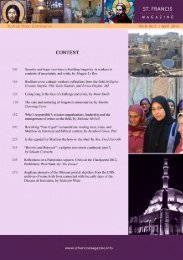Download the pdf - St.Francis Magazine
Download the pdf - St.Francis Magazine
Download the pdf - St.Francis Magazine
You also want an ePaper? Increase the reach of your titles
YUMPU automatically turns print PDFs into web optimized ePapers that Google loves.
<strong>St</strong> <strong>Francis</strong> <strong>Magazine</strong> Vol 9, No 4 | August 2013<br />
There is something very wrong here. We are told that insider movements are born<br />
spontaneously, that <strong>the</strong>y are successful and, without really being able to learn about <strong>the</strong>m, we are<br />
told that <strong>the</strong>y are ‘obedient’ (Higgins) and ‘faithful’ (Lewis). We don’t ever hear from <strong>the</strong> Muslims<br />
around <strong>the</strong>m– do <strong>the</strong> Muslims think <strong>the</strong>y are ‘remaining within <strong>the</strong>ir oikos ’ or do <strong>the</strong>y think <strong>the</strong>y are<br />
being dishonest<br />
These questions are dealt with magnificently in what, to me, was <strong>the</strong> most fascinating part of <strong>the</strong><br />
Morton book– <strong>the</strong> second appendix, titled ‘Insider Movements in West Java, Indonesia: A Case<br />
<strong>St</strong>udy’ (pp 108-123), written by veteran missionary and scholar of mission, Roger Dixon. In sum, he<br />
shares about <strong>the</strong> early experience in West Java, how IM influence increased and was imported (from<br />
Bangladesh, it appears), how a number of missionaries actually went and officially converted to Islam<br />
at <strong>the</strong> mosque, and how IM advocates increasingly separated <strong>the</strong>mselves from o<strong>the</strong>rs, including <strong>the</strong><br />
indigenous churches, and stopped communicating with o<strong>the</strong>r workers and Christians. Eventually, ‘It<br />
became impossible ei<strong>the</strong>r to validate or challenge <strong>the</strong>ir claims of success because <strong>the</strong>y would not<br />
share information.’ (117)<br />
Dixon also points out that <strong>the</strong> Bangladesh study which Dudley Woodberry used in <strong>the</strong> 90s to<br />
promote IM-style method has been discredited. I would not know, because no one can get that<br />
study. But this is ano<strong>the</strong>r weakness of IM– it does not deliver. Anywhere. Evangelicals run <strong>the</strong>ir<br />
churches like businesses. And I don’t say that in a disparaging way; it is both a strength and a<br />
weakness. And when we hear about a business model that is working well somewhere (Bangladesh),<br />
it is logical to want to copy it elsewhere. We do this all <strong>the</strong> time. The problem is that <strong>the</strong> success in<br />
Bangladesh was smoke and mirrors. It was like <strong>the</strong> ‘success’ of Enron before it became apparent that<br />
much of its growth was not genuine or lasting. Dixon is not saying that Woodberry et al.<br />
intentionally were lying, but he is pointing out something important. IM does not deliver. It did<br />
not deliver in Bangladesh, and it didn’t work in Indonesia ei<strong>the</strong>r. Dixon mentions one experienced<br />
and charismatic man who managed to assemble a group of disciples. But that is, he says, <strong>the</strong><br />
exception. “During <strong>the</strong> past twenty-five years, Frontiers has put teams in three cities, but none of<br />
<strong>the</strong>m were successful in church planting o<strong>the</strong>r than <strong>the</strong> ga<strong>the</strong>ring of a few believers of mixed ethnic<br />
and religious backgrounds” (116).<br />
So let us return to that stronghold of Insiderdom– Dave Bogs’ Wikipedia page. The page asserts<br />
that <strong>the</strong> movements are real, that <strong>the</strong>y come from <strong>the</strong> people and not from missionaries. Yet in<br />
Dixon’s appendix we find that IM does not even work as a strategy. This needs to be made very clear.<br />
There is a difference between IM as a description of an indigenous-initiated movement, and IM as a<br />
missionary strategy. Go to Bogs’ Wikipedia page and try to post something pointing this out, or<br />
pointing out what I listed above– that <strong>the</strong>re is no competent empirical evidence that insider movements<br />
even exist. It will be cut out, undone or deleted tout suite.<br />
When we ask for studies, we get a cute anecdote from Brown. Or we get a long interview in CT<br />
that just doesn’t hold up to scrutiny (thank you Mr Wario). Or we get a creative, indigenous,<br />
contextual Christian mission (Sadrach) that actually doesn’t match <strong>the</strong> definition of an insider<br />
movement, but it was successful so it is co-opted. Or you get allegations of research that is too<br />
secret to share and has been discredited anyway (Woodberry’s study of Bangladesh). Or you are<br />
pointed to one evangelical Christian trained at Fuller who left evangelicalism for ‘Jesusy’-Sufi-Islam<br />
(Mazhar Mallouhi, who I’m sure is a splendid guy).<br />
When we call into question some of <strong>the</strong> Biblical and historical underpinnings of IM, we are<br />
accused of being extractionists who disvalue <strong>the</strong> incarnation. Ya rabb! This is certainly not a little<br />
quibble about words, is it<br />
Regarding <strong>the</strong> totally unsubstantiated allegation that <strong>the</strong>re exist insider movements that were not started<br />
by missionaries or coordinated by missions, we ask for information. Not an anecdote (thank you Mr<br />
Brown), but a real case study that can be scrutinized (as Mr Wario did with that sad CT interview).<br />
And let it be a movement, as you claim it to be, and not a simple individual here or <strong>the</strong>re.<br />
Regarding insider movements as a missionary strategy, let <strong>the</strong>re be a clear differentiation. The<br />
problem is that IM folks want to have <strong>the</strong>ir cake and eat it too. When people question <strong>the</strong> goodness<br />
of <strong>the</strong> IM paradigm, <strong>the</strong>y are told that God is already doing this, and by <strong>the</strong>ir very definition<br />
(Higgins, Lewis) <strong>the</strong>y are obedient and Biblical and faithful. Hard to disagree with something like<br />
that. We are told that <strong>the</strong> strategy is simply an affirmation of IM as an alleged non-Western reality.<br />
We ask for evidence that <strong>the</strong>se exist and are told it is secret, or we are given anecdotes, or material<br />
that does not hold up under scrutiny.<br />
<strong>St</strong> <strong>Francis</strong> <strong>Magazine</strong> is published by Arab Vision and Interserve 57







![Reflections on Surah Fatiha and the Lord's Prayer[1] - St.Francis ...](https://img.yumpu.com/49377951/1/184x260/reflections-on-surah-fatiha-and-the-lords-prayer1-stfrancis-.jpg?quality=85)









